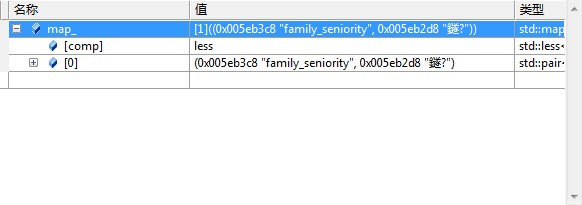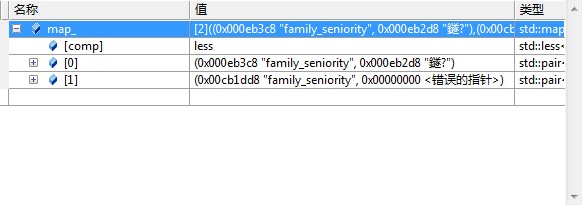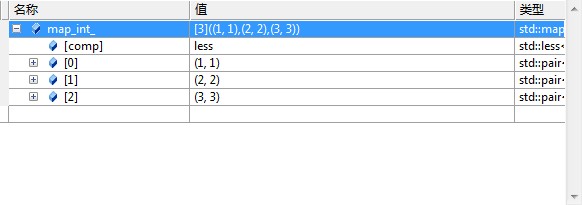最近在使用的std::map的过程中发现了一个小问题,折腾了半天之后才发现自己忽略了一个地方。相信也有人遇到和我一样的情况,在这里做个记号,将问题和解决办法和大家共享一下。这里有一个函数,暂且叫做getMap(),是Doc类中的一个类成员函数。getMap返回一个std::map,具体的类型定义如下:
std::map<const char*,const char*>map_;
此map有一堆键值:family_seniority=shen;键值的类型都是const char*。于是我在main函数里试图调用getMap取到这个map,进而取到这个map里面的family_seniority键的值。但是,就在这里问题来了,运行之后我的程序崩溃了,然后单步调试请看下面的图。

事实证明我想要的这个std::map已经成功返回了,而且还带入了我想要的值,接下来我试图把这个index为0的一对键值取出来:
const char* strss = map_["family_seniority"];
然后我 std::cout << strss << std::endl;尝试输出,结果程序崩溃了,于是我把断点打在这句输出的代码上,调试的结果大吃一惊:

怎么map里面有两对键值了,怎么会这样?我一下子蒙了,我没有做任何操作啊。我在调用getMap()方法之后获得map之后就立即const char* strss = map_["family_seniority"];有了这句,再下面一句就是输出,应该就是这三句之间的某句代码有问题了。我尝试进入getMap()函数,发现map返回的时候也是只有一对键值,那么问题肯定就是出现在:
const char* strss = map_["family_seniority"];
这句代码上。但是我想了之后,这只是一个简单的取键值得操作,怎么会出现这个问题,但是我查看了文档之后才发现,当使用operator[]操作取键值时会自动在整个map里查找一次,如果发现了有family_seniority这个键,就返回这个键相对应的值,如果没有则在map里插入这个键。下面是重载[]符号的源代码:
T& operator [] (const key_type& k)
{
return (*((insert(value_type(k,T()))).first)).second;
}
也就是说,一旦使用了[]符号,就会调用此重载,调用insert语句,键就是插进去的键,而键值则是一个T类型的临时对象,这样也就解释了family_seniority这个键被添加进去了,但是键值是不存在的,因为char()这个临时对象是未知的。这样也就解释了const char* strss = map_["family_seniority"];这句之后为什么会有两对键值了。
问题又来了,我的map里明明是有这个family_seniority键的呀,怎么还会插入一条呢?于是我再检查了下我的map定义:std::map<const char*,const char*>map_;恍然大悟,我的模板参数是const char*,是指针。也就是说实际上在map里面把指针地址作为了键,并没有把指针所指的内容family_seniority作为键。从第二张图看到,两个键的地址为0x000eb3c8,0x00cb1dd8,这根本就是两个不同的地址,再operator[]内的查找过程中,0x000eb3c8 != 0x00cb1dd8。这样问题的原因也就找到了,由于是将字符串指针作为了地址,因此当使用operator[]取family-seniority值,只是在map里查找地址,发现没有所要取的地址,于是就插入了一条,这样也就导致了strss为0x00000000。
再往更深层次追求就发现,上面的这个理由略微有点牵强,为什么呢?因为我们知道,map是一个模板类,这个模板类有四个参数,请看map的申明:
template<class _Kty,
class _Ty,
class _Pr = less<_Kty>,
class _Alloc = allocator<pair<const _Kty, _Ty> > >
class map
: public _Tree<_Tmap_traits<_Kty, _Ty, _Pr, _Alloc, false> >
{ // ordered red-black tree of {key, mapped} values, unique keys
};
其中第三个参数_Pr默认为less。map实际上是有一个排序功能的,这个排序默认为小于排列,也就是根据键从小到大排列,class _Pr = less<_Key>则说明map是默认小于排列的,为了验证,我写了一个测试东东:
std::map<int ,int> map_int_;
map_int_[2] = 2;
map_int_[1] = 1;
map_int_[3] = 3;
上面的代码上,我是按照2、1、3这个顺序往map中插入的,然后调试:

发现键的顺序已经是从小到大排列了,也就说说明map确实是默认小于排列的。但是这仅仅都是针对那些可以比较的数据类型,虽然指针也是可比较的,但是我们想比较的是指针所指向的内容,若与传入的键命相等,则取出该键的值,这样在operator[]过程中就涉及到一个查找一个一比较过程,而且要求比较的不能是地址,而是地址中的内容。从map的申明可以看出,_Pr是给了默认值,在map内部有:
typedef _Pr key_compare;
typedef _Tree<_Tmap_traits<_Kty, _Ty, _Pr, _Alloc, false> > _Mybase;
再看map中的函数:
map()
: _Mybase(key_compare(), allocator_type())
{ // construct empty map from defaults
}
map(const _Myt& _Right)
: _Mybase(_Right)
{ // construct map by copying _Right
}
explicit map(const key_compare& _Pred)
: _Mybase(_Pred, allocator_type())
{ // construct empty map from comparator
}
map(const key_compare& _Pred, const allocator_type& _Al)
: _Mybase(_Pred, _Al)
{ // construct empty map from comparator and allocator
}
template<class _Iter>
map(_Iter _First, _Iter _Last)
: _Mybase(key_compare(), allocator_type())
{ // construct map from [_First, _Last), defaults
this->insert(_First, _Last);
}
template<class _Iter>
map(_Iter _First, _Iter _Last,
const key_compare& _Pred)
: _Mybase(_Pred, allocator_type())
{ // construct map from [_First, _Last), comparator
this->insert(_First, _Last);
}
template<class _Iter>
map(_Iter _First, _Iter _Last,
const key_compare& _Pred, const allocator_type& _Al)
: _Mybase(_Pred, _Al)
{ // construct map from [_First, _Last), comparator, and allocator
this->insert(_First, _Last);
}
_Myt& operator=(const _Myt& _Right)
{ // assign by copying _Right
_Mybase::operator=(_Right);
return (*this);
}
map(_Myt&& _Right)
: _Mybase(_STD move(_Right))
{ // construct map by moving _Right
}
_Myt& operator=(_Myt&& _Right)
{ // assign by moving _Right
_Mybase::operator=(_STD move(_Right));
return (*this);
}
mapped_type& operator[](key_type&& _Keyval)
{ // find element matching _Keyval or insert with default mapped
iterator _Where = this->lower_bound(_Keyval);
if (_Where == this->end()
|| this->comp(_Keyval, this->_Key(_Where._Mynode())))
_Where = this->insert(_Where,
_STD pair<key_type, mapped_type>(
_STD move(_Keyval),
mapped_type()));
return ((*_Where).second);
}
void swap(_Myt& _Right)
{ // exchange contents with non-movable _Right
_Mybase::swap(_Right);
}
void swap(_Myt&& _Right)
{ // exchange contents with movable _Right
_Mybase::swap(_STD move(_Right));
}
当map构造的时候调用了_Tree<_Tmap_traits<_Kty, _Ty, _Pr, _Alloc, false> >这个模板类,在operator[]中,有一句代码:
this->comp(_Keyval, this->_Key(_Where._Mynode()));
这个comp函数是_Tree<_Tmap_traits<_Kty, _Ty, _Pr, _Alloc, false> >这个模板类中的,于是找到这个模板类的代码,代码比较短,我就一次性全贴出来:
template<class _Kty, // key type
class _Ty, // mapped type
class _Pr, // comparator predicate type
class _Alloc, // actual allocator type (should be value allocator)
bool _Mfl> // true if multiple equivalent keys are permitted
class _Tmap_traits : public _Container_base
{
// traits required to make _Tree behave like a map
public:
typedef pair<_Kty, _Ty> _Val_type;
typedef _Kty key_type;
typedef pair<const _Kty, _Ty> value_type;
typedef _Pr key_compare;
typedef typename _Alloc::template rebind<value_type>::other
allocator_type;
enum
{ // make multi parameter visible as an enum constant
_Multi = _Mfl
};
_Tmap_traits()
: comp()
{ // construct with default comparator
}
_Tmap_traits(_Pr _Parg)
: comp(_Parg)
{ // construct with specified comparator
}
class value_compare
: public binary_function<value_type, value_type, bool>
{ // functor for comparing two element values
friend class _Tmap_traits<_Kty, _Ty, _Pr, _Alloc, _Mfl>;
public:
bool operator()(const value_type& _Left,
const value_type& _Right) const
{ // test if _Left precedes _Right by comparing just keys
return (comp(_Left.first, _Right.first));
}
value_compare(key_compare _Pred)
: comp(_Pred)
{ // construct with specified predicate
}
protected:
key_compare comp; // the comparator predicate for keys
};
template<class _Ty1,
class _Ty2>
static const _Kty& _Kfn(const _STD pair<_Ty1, _Ty2>& _Val)
{ // extract key from element value
return (_Val.first);
}
_Pr comp; // the comparator predicate for keys
};
在map中传入的_Pr在模板中被typedef 了key_compare;然后_Pr 定义了一个comp对象(从字面上来理解就是比较),而该模板内部重载了operator(),这个函数内部调用了comp();显然在这个comp对象中肯定也有一个对()进行重载的函数。也就说,在查找过程,传入的键与map已经存在的键进行比较的函数实际就是map的父类中的comp对象中的operator()重载函数,只不过这个值被默认设置为less了。
再回来遇到的问题,问题的根本原因就是因为只是对指针做了比较,而并没有对指针的内容进行比较。但是默认的只是取了&进行比较,怎样才能实现指针内容的比较呢?可以尝试传入一个_Pr类型进去呢,在_Pr类里面进行()重载,这样不就可以调用外部的comp进行指针的内容比较了么?代码如下:
class sort
{
public:
bool operator()(const char* str1, const char* str2)
{
return strcmp(str1, str2) < 0;
}
};
//std::map<const char*,const char*,sort>map_;
std::map<const char*,const char*,sort> map_ = pDoc->getMap();
const char* strss = map_["family_seniority"];
std::cout << strss << std::endl;
OK!成功取到了family_seniority键的值!虽然不是很大的问题,但是我觉得还是一个容易忽略的地方,一旦std::map中的键位指针时,此时就要考虑默认的less能否将指针的内容取出进行比较,从而顺利取到键值,答案是不确定的。此方法还使用当键位结构体或者类时,也可以传入外部的自实现比较函数,从而达到目的。